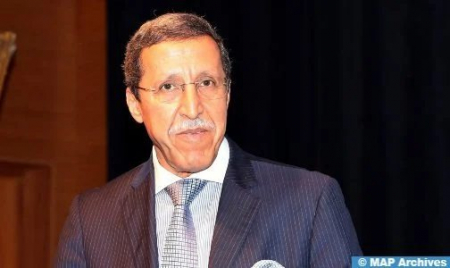Security Council: Morocco’s Hilale Outlines Royal Strategy to Fight Terrorism in Africa
Morocco’s Permanent Representative to United Nations, Ambassador Omar Hilale outlined, Tuesday before the Security Council, the main pillars of the strategy put in place by Morocco under the leadership of His Majesty King Mohammed VI to fight terrorism, particularly in Africa. The ambassador was speaking during a public debate, proposed by the Algerian presidency of the Security Council this January, under the title “The fight against terrorism led by Africa and focused on development”. In line with the far-sighted vision of His Majesty King Mohammed VI, Morocco has adopted a major national strategy, based on a multidimensional, proactive and inclusive approach to prevent and eradicate terrorism, Hilale stressed. The strategy implemented by the Kingdom is based on four fundamental pillars: strengthening security and the legal framework, enhancing economic and human development, preserving religious identity and promoting regional and international cooperation, the diplomat explained. He also noted that the Moroccan strategy is mainly focused on promoting a moderate Islam, based on the universal values of coexistence and peace, adding that these are the principles that the Kingdom shares with many countries, including brotherly African countries. In this respect, the ambassador highlighted the role of the Mohammed VI Foundation for African Ulema and the Mohammed VI Institute for the Training of Imams, Morchidines and Morchidates, specifying that these two institutions actively respond to requests from African, European and Asian countries for the training of religious leaders. Since its creation in 2015, the Mohammed VI Institute for the Training of Imams, Morchidines and Morchidates has trained more than 3,000 beneficiaries from various African countries, he recalled, adding that this January, the Institute celebrated the graduation of 100 imams from Mali. On the other hand, Omar Hilale warned against the link between separatism, terrorism and cross-border crime which, according to him, constitutes a very serious phenomenon for peace and security on the African continent. In the same vein, the ambassador denounced the growing collusion between some separatist groups and terrorist organizations, such as Al-Qaeda and Daesh, noting that this phenomenon “dangerously exacerbates regional instability in Africa”. “These pernicious alliances do not only sow terror. They divide fragile communities, exploit the structural vulnerabilities of societies and fuel a cycle of persistent insecurity” in Africa, he warned, noting that separatist groups, in particular, are trying to take advantage of this destabilization to threaten the territorial integrity of Member States and undermine their development. The diplomat deemed it essential that the international community mobilize proactively to anticipate, counter and neutralize these destabilizing groups, which endanger peace, security and the rule of law. During this meeting, Morocco’s Permanent Representative to the UN expressed the Kingdom’s firm commitment to its partnership with the UN system, embodied by concrete actions such as the establishment of the ONUCT Program Office in Rabat, the first of its kind in Africa. The establishment of this Office demonstrates the Kingdom’s steadfast commitment to pooling expertise with ONUCT, in order to provide quality training for the benefit of African States, according to a collaborative and supportive approach reflecting a spirit of collective responsibility, he said, recalling that since its creation in 2021, this structure has trained more than 2,000 agents from 38 African countries. Hilale also reiterated Morocco’s willingness to continue working to strengthen and diversify this partnership in order to meet the needs and expectations of the African countries. He also cited the Marrakech Platform, a high-level event bringing together the heads of counterterrorism and security agencies in Africa, the 3rd edition of which took place in Fez in June 2024. The ambassador further indicated that the fight against terrorism goes far beyond the security framework. According to Hilale, it is part of a global and holistic dynamic, where the protection of human rights and fundamental freedoms, the preservation of the values of peace and human dignity, as well as the promotion of partnerships and international cooperation, become essential levers to eradicate the root causes of this scourge and sustainably prevent its impacts and ravages.

